Merchant of Venice Workbook Answers Act 4 – Passages with Reference to the Context – ICSE Class 10 & 9 English
ICSE SolutionsSelina ICSE SolutionsML Aggarwal Solutions
EnglishMathsPhysicsChemistryBiology
Passage – 1
(Act IV, Sc.I, Lines 30-33)
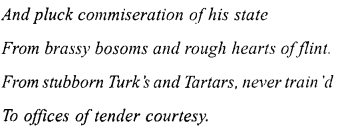
Context : These lines occur in Act IV, Scene I, of The Merchant of Venice written by William Shakespeare. In this famous Trial Scene, we find the Duke requesting the Jew not to be barbarious in accepting only the flesh and nothing else.
Explanation : The Duke pleads with Shylock to pacify his anger and cruelty. He says that recently Antonio has been the victim of many losses. The royal merchant has been reduced to a sorry plight. His condition is so sad and pathetic that it is bound to give rise to pity and sympathy even in the cruel and hard-hearted Turks and Tartars who never know what pity is. The Duke appeals to Shylock that he should sympathetically consider the sad losses which have come crowding on Antonio.
Passage – 2
(Act IV, Sc.I, Lines 47-52)
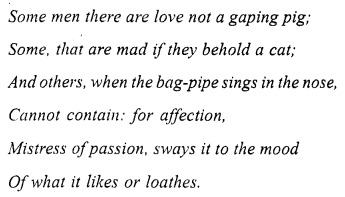
Context : These lines are spoken by Shylock in the first scene of Act IV of The Merchant of Venice. After the forfeiture of the bond, Shylock is determined to cut the pound of flesh from Antonio’s body. The Duke in the court requests him to give up this intention and asks him why he is so much bent upon it when it is of no use to him. To this Shylock replies that it is his personal choice and nobody can question it.
Explanation : In this famous Trial Scene, Shylock makes a spirited and rational defence of his conduct in repeatedly insisting upon a pound of Antonio’s flesh. His arguments are evasive; hatred is more or less instinctive and irrational. Why should one man like a thing and another man hate it? A gaping or a harmless cat can do one no mortal injury; still there are people who hate them. His implication is that Antonio had done him injury; and even without that, he can hate him.
Passage – 3
(Act IV, Sc.I, Lines 94-97)
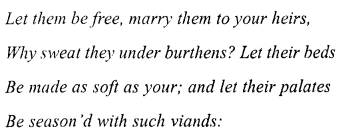
Context : These lines from Act IV, Scene I, of The Merchant of Venice contain Shylock’s powerful and logical retort and reply to the Duke’s question that how can he (Shylock) hope for God’s mercy when he himself shows none.
Passage – 4
(Act IV, Sc.I, Lines 221-222)

Context : These lines from Act IV, Scene I of The Merchant of Venice, contain Shylock’s exclamation at Portia’s remark that the law of Venice cannot be perverted or wrested in favour of Antonio, because that will bring disgrace to the law of Venice itself and many discrepancies will be introduced into the law by following bad examples.
Explanation : Shylock feels exultant and says that Portia, in delivering his judgement, is acting as wisely as Daniel, the famous judge mentioned in the Bible.
It is noteworthy that Shylock compares ‘the wise young judge’ to Daniel. This is one of the numerous touches which indicate Shylock’s intimate knowledge of the Old testament.
Passage – 5
(Act IV, Sc.I, Lines 266-270)
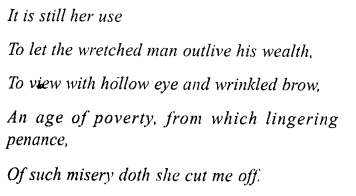
Context : These words are spoken by Antonio in. the Trial Scene of The Merchant of Venice. Portia after addressing a noble appeal for mercy to Shylock, has told him that he can have thrice the amount loaned to Antonio. Bassanio is willing to pay even more. But Shylock says that he must have his bond and that is no use asking him for mercy because there is nothing ‘in the tongue of men’ that can alter him. Portia then (disguised as a lawyer of course) tells Antonio to prepare himself so that Shylock may have his one pound of flesh nearest his heart. Portia asks Antonio if he has anything to say in his defence.
Explanation : Antonio in a long speech, says that he has nothing to say in his self-defence. He bids farewell to his dear friend Bassanio by saying that even in the ‘forfeiture’ of the bond, Fortune has been kinder to him than she is ordinarily to other men. Cruel Fortune, according to Antonio, generally makes men out¬live all their wealth. But, she has saved him, at least, from that distress.
Passage – 6
(Act IV, Sc.I, Lines 47-52)
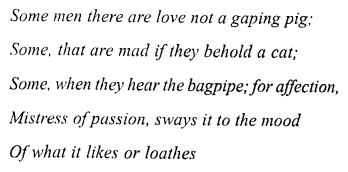
Context : These lines are taken from The Merchant of Venice and from part of Shylock’s answer to the Duke of Venice in the Trial Scene when the Jew has been advised by the Duke to show pity to Antonio.
Explanation : The Jew says that it is not necessary for him to state any reasons for his insistence on the pound of flesh. There are people who cannot tolerate the sight of an open mouthed pig. Others feel enraged at the sight of a cat. Others feel infuriated to hear the music of the bagpipe (a musical instrument). In all these case, there is no definite reason for people’s’dislike of various things. It is just a matter of one’s inclination or taste. One’s likes and dislikes are not determined by any rational considerations but just by whims. Shylock means that he wants the pound of flesh just because he hates Antonio and not on any rational grounds.
Passage – 7
(Act IV, Sc.l, Lines 71-72)
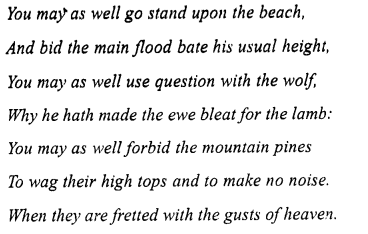
Context : These words are spoken by Antonio to his friend Bassanio in The Merchant of Venice in the Trial Scene.
Explanation : Antonio says that nothing is more difficult than to softer the hard – hearted Jew. To soften him is as difficult as to make the ocean obey an order to diminish the fury of its waves; as useless as to ask to wolf why it has killed the lamb and thus caused distress to the ewe; as fruitless as to ask the pine-trees growing on a mountain side not to toss their branches and not to produce any sound, when the wind blows upon them.
Passage – 8
(Act IV, Sc.l, Lines 130-137)
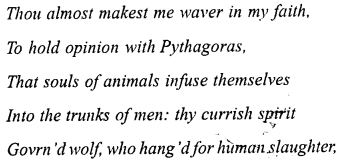

Context : These words are spoken by Gratiano to Shylock in The Merchant of Venice when the former sees the cruel attitude of the Jew in the court just before the entry of Portia.
Explanation : Gratiano bitterly remarks that the Jew’s attitude almost upsets his Christian faith. Gratiano now agrees with Pythagoras who said that the souls of animals pass into human bodies. The beastly soul in the body of Shylock, says Gratiano, must have been originally a wolf’s. When that wolf was hanged to death for killing human beings, its cruel soul must have entered Shylock’s body when he (Shylock) was still in the womb of his devilish mother.
Passage – 9
(Act IV, Sc.l, Lines 182-195)
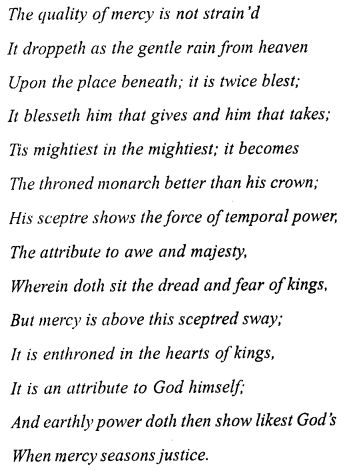
Context : This is the first part of Portia’s famous “Quality of Mercy” speech addressed to Shylock in The Merchant of Venice in the Trial Scene.
Explanation : Portia says that the feeling of mercy cannot be forced from a human being. Mercy springs as naturally or spontaneously from the human heart as the rain falling from clouds on earth. Mercy yields a double reward— it blesses him to whom mercy is shown, but it also blesses him who shows mercy. The greater the person showing mercy, the higher is the quality of mercy. A king appears to be better by his mercy than by his crown. The king’s scepter is a symbol of his earthly power. It is a sign of his majesty and its purpose is to stir fear and awe in the hearts of the subjects. But mercy is a nobler power. The true place for mercy is in the heart of king. Mercy is an essential quality of God Almighty. A human authority acquires a divine character by softening the hardness of justice with mercy.
Passage – 10
(Act IV, Sc.I, Lines 264-269)
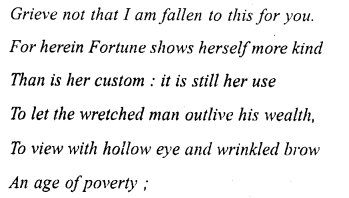
Context : These words are spoken by Antonio to Bassanio in The Merchant of Venice during the Trial Scene when all appeals for mercy have failed to melt the heart of the Jew.
Explanation : Antonio asks Bassanio not to feel sad because he is going to meet death of friend’s sake. He says that it is fortunate that he is going to die soon after becoming poor. Usually a man who has suffered reverse of fortune lives long enough to spend his old age in poverty. But it is better to die than to live long in a state of wretchedness and bankruptcy.
For More Resources
